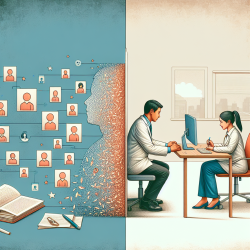In the rapidly evolving landscape of teletherapy, therapists are often faced with the choice between conducting sessions via phone or videoconferencing. A recent study titled "Therapist-Reported Differences between Teletherapy via Phone and via Videoconferencing" sheds light on this very topic, offering valuable insights that can help practitioners improve their skills and confidence in delivering remote therapy.
Understanding the Research
The study compared therapists' attitudes, professional self-doubt, and the quality of the therapeutic relationship in sessions conducted via phone versus videoconferencing. The findings revealed that while therapists' attitudes and perceptions of the therapeutic relationship were generally similar across both formats, there was a notable difference in levels of professional self-doubt. Specifically, therapists reported higher levels of self-doubt during videoconferencing sessions compared to phone sessions.
Key Takeaways for Practitioners
Here are some actionable insights derived from the study that can help therapists enhance their teletherapy practice:
- Embrace Familiarity: Therapists with previous experience in phone therapy reported more positive attitudes and stronger therapeutic relationships. Therefore, gaining familiarity with both phone and videoconferencing technologies can boost confidence and improve the quality of therapy.
- Practice Makes Perfect: Higher levels of professional self-doubt were observed in videoconferencing sessions, likely due to the relatively new nature of this technology for many therapists. Regular practice and training in videoconferencing can help mitigate these doubts.
- Focus on the Therapeutic Relationship: Despite the format, the quality of the therapeutic relationship remains crucial. Building a strong working alliance and real relationship with clients can be achieved through both phone and video sessions.
- Leverage Professional Support: The study found that therapists felt more external pressure but also more professional support for using videoconferencing. Tapping into this support can facilitate a smoother transition to video sessions.
Encouraging Further Research
While this study provides important insights, it also highlights the need for further research to fully understand the nuances of teletherapy. Therapists are encouraged to stay updated with the latest research and continue exploring the most effective ways to deliver remote therapy.
To read the original research paper, please follow this link: Therapist-Reported Differences between Teletherapy via Phone and via Videoconferencing.










